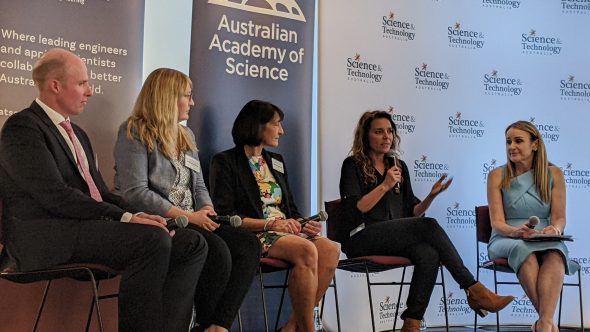Australia should seize the moment to become a global battery manufacturer to power the next wave of renewable energy development, the Parliamentary Friends of Science heard last night.

At a special event for the Parliamentary friendship group – organised by Science & Technology Australia – an expert panel told a powerful story of how the right strategic investments now could turbo-charge Australia's energy and economic future.
The panel included Professor Lachlan Blackhall of The Australian National University; Director of storEnergy Professor Maria Forsyth; ARC Future Fellow, Superstar of STEM and hydrogen expert Dr Jessica Allen; and the Executive Director of Original Power and Yorta Yorta descendant Karrina Nolan.
Parliamentary Friends of Science is a cross-party group of MPs and Senators who are passionate about science and science solutions. It is co-convened by Deputy Prime Minister and Defence Minister Richard Marles MP and Shadow Minister for Home Affairs and former Science Minister Karen Andrews MP – who led last night's event.
The event – Clean, Green, Energy Technologies – had a huge turnout from Parliamentarians, including Minister for Science Ed Husic, Shadow Minister for Science Paul Fletcher, Minister for Housing Julie Collins, Labor's Zaneta Mascarenhas, the Coalition's Zoe McKenzie, Nola Marino, Rowan Ramsey, Dr Anne Webster, and Senator David Van, and independent MPs Zali Steggall, Allegra Spender, Kylea Tink, Kate Chaney and Senator David Pocock.
The Parliamentarians heard from the panel about the rapidly-evolving renewable energy landscape, and took the opportunity to quiz the experts on the public policy settings Australia needs to capitalise on the huge global growth and economic opportunities ahead from battery energy storage.
The panel highlighted that the technology that powers the world's solar panels was developed in Australia more than three decades ago, but a combination of limited capital investment and limiting policy settings meant the country's intellectual property was instead developed overseas.
They stressed that Australia has the resources and expertise to develop onshore battery manufacturing, but without the right policy settings and sufficient market capital there was a risk that this intellectual property, too, could be developed by our economic competitors.
"We actually can do it here," said Professor Blackhall.
"And it will be our own expertise that allows us to accelerate through the energy transition. We're miles ahead of the rest of the world when it comes to the energy transition – both in terms of the uptake of renewables, but also in dealing with these challenges and opportunities of how you integrate renewables and decarbonise your economy.






